
“You — you asked me to open a company, and I said ‘yes?”’ … I have no clue what you’re talking about, Omar.”
The man on the phone with Omar Spahi in March 2020 was in a panic. His best friend, Omar, had called to warn that he might start receiving phone calls from lawyers about a construction company named Progressive.
Apparently, the company was in the man’s name. But he had never heard of it.
“You guys were doing construction and just, like, overcharging or something?” the man asked Omar, according to a transcript of the call contained in court records related to a civil lawsuit.
“Yeah, pretty much, was my understanding,” Omar replied. “This is all, like, what my dad is telling me.”
The 25-minute conversation was a decade in the making — and had multimillion-dollar implications. For years, residents of the massive Ocean Towers luxury co-op complex in Santa Monica had worried that Omar’s father, John, was abusing the power he held as a member of the buildings’ homeowners association board.
Several residents filed lawsuits accusing the elder Spahi of a wide array of misconduct, including: manipulating board elections,draining the HOA’s accounts to fund personal legal battles, inside dealing of valuable real estate, and driving the complex further into debt by pushing the HOA to take out bank loans without shareholder approval.
Residents didn’t grasp the scale of the alleged problems until last year — when a Los Angeles County grand jury handed down a 119-count indictment accusing both Spahis, now-former Ocean Towers Housing Corp. President Joseph Orlando and his wife, Dorothy, of grand theft, identity theft and money laundering.
The California attorney general’s office alleges that the four stole approximately $5.7 million from the residents they were supposed to be working for, largely by billing the HOA for construction projects that Progressive never actually carried out. Orlando wielded power over the board as its president for three decades, while John Spahi served on the board for roughly 18 years.

But the indictment only tells the final chapter in a decade-long story. A Times review of thousands of pages of emails and court records, as well as interviews with residents, shows the Spahis and Orlandos allegedly went to great lengths to amass power inside one of the most valuable pieces of real estate in the Los Angeles area, with some of the moves driving a wedge between John and his son.
At least once, Orlando ordered the cancellation of an HOA board election as the allegations against him and the Spahis mounted, according to an email obtained by The Times. Those who spoke out against the Spahis and Orlandos say they were sued, threatened with the revocation of their leases or blocked from selling their units, an action that requires the board’s approval.

Subscribers get exclusive access to this story
We’re offering L.A. Times subscribers special access to our best journalism. Thank you for your support.
Explore more Subscriber Exclusive content.
According to multiple lawsuits, Spahi, his relatives and partners frequently transferred units among themselves. By the time he was 21, Omar held a multimillion-dollar real-estate portfolio. He then declared bankruptcy.
Dorothy Orlando, 72, died of cancer in November, her attorney said. Outside a downtown L.A. courthouse last year, Joseph Orlando, 74, ignored questions from The Times while an unidentified person shielded him from a camera. A spokeswoman for his attorney, Phillip Cohen, did not respond to a detailed list of questions.
Peter Swarth, an attorney for John Spahi, 71, declined to comment for this article.
Omar, 35, declined to speak to a reporter in February after a hearing in which his attorney was allowed to quit the case due to a lack of payment. Omar is now represented by an attorney appointed by the court. The attorney did not respond to calls and emails seeking comment.
“They’ve sucked our blood for the past 25 years,” said Adel Salawy, a longtime resident who has sued John multiple times and settled twice.
Homeowners associations are essentially quasi-governments. Funded by residents’ dues, they control the budget for communal repairs, set rules for what people can and can’t do with their own property and manage massive amounts of cash. These associations are run by boards of elected homeowners.
Busy residents may not be interested in keeping tabs on HOA actions, and if they are, may not understand financial statements they have access to, said Richard Green, director of the USC Lusk Center for Real Estate.
“You have a stew [of] poor governance even when there’s no intention for malfeasance,” he said.

The fraud that authorities and lawsuits allege occurred at Ocean Towers, however, is on a scale as grand as the buildings themselves.
The pair of 19-story towers sits three miles north of the Santa Monica Pier, offering stellar views of the beaches that stretch along Pacific Coast Highway toward Malibu. Most units are valued at more than $1 million, well above the average condo price of $675,000 in L.A County.
“You just look out the window and it’s a little slice of heaven,” said former resident Alex Lamm.
Attorney Jeffrey Wittenberg can see the buildings from the conference room of his Santa Monica office. It’s a constant reminder of how much of his time the complex has taken up.
Wittenberg first had dealings with Ocean Towers a decade ago when representing a woman who had inherited a unit. She didn’t live in Los Angeles and wanted to sell. But Ocean Towers is not a condominium complex, in which people own their units, but a co-op. Under that structure, the HOA owns the entire complex. Aspiring homeowners purchase a share of the HOA and gain exclusive rights to occupy their unit.
Owners can sell those rights, but the HOA must grant approval. According to a lawsuit, the only potential buyer the woman’s agent brought to the board’s attention was one the agent also represented. That buyer was “connected to” John Spahi, according to the lawsuit, and that buyer’s offer was at a price Wittenberg described as 40% below market value.
Court records show the case was settled in 2017, but the details are not public. Wittenberg declined to comment on the specifics.
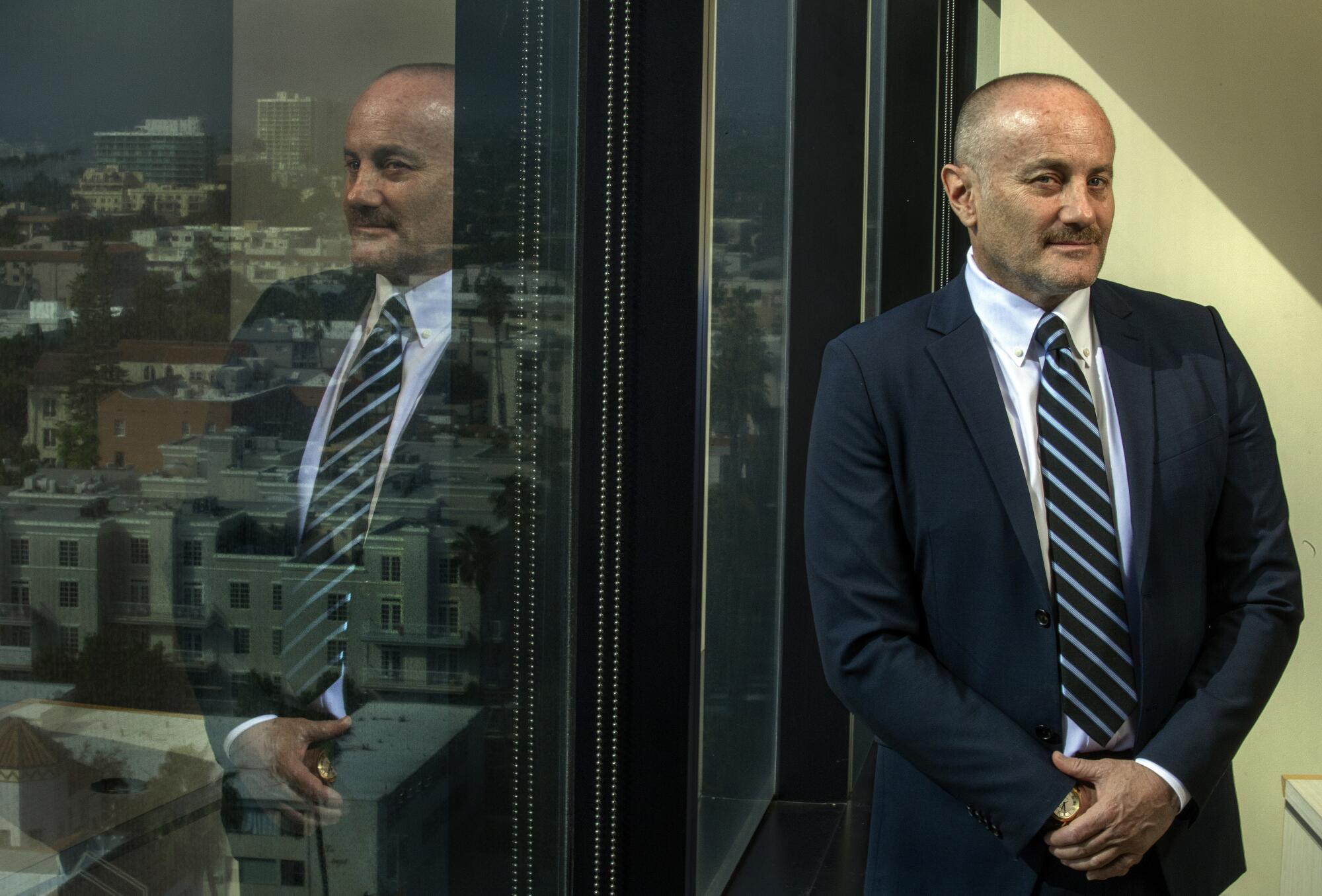
A number of lawsuits over the past decade and a half alleged that John Spahi and his partners had used the HOA and eviction court to manipulate sales of units in the building to buyers they had control or influence over. The alleged scheme involved attempts to cancel existing mortgages on units they had an ownership interest in — without paying the bank debt — and then leasing or selling the properties for top dollar and pocketing the money.
This scenario was laid out in at least seven lawsuits filed by U.S. Bank, which owned the mortgages in question:
In the first part of the process, John Spahi and his partners, including his son, defaulted on their HOA fees for the units, according to the suits. Citing the missed payments, the HOA — in which John Spahi and Orlando held leadership roles — then filed eviction lawsuits. The suits were uncontested, according to the U.S. Bank suits and eviction court records. When the HOA won the eviction proceedings by default, it took control of the units and sold them for below market value to a Spahi relative or entities that John had an interest in, claiming its judgments in the eviction cases extinguished U.S. Bank’s rights to the properties.

In one instance, the HOA transferred a unit to a trust whose beneficiaries were John and Omar Spahi, according to a lawsuit from U.S. Bank. The trust, according to a separate lawsuit filed by Wittenberg, had purchased the unit for $11,382.
After the acquisition, Omar listed the property for sale at $3.9 million, according to the U.S. Bank suit. The case was terminated after the court issued a judgment finding the transfer to the trust was void and U.S. Bank retained an interest in the property.
In another case, one of John’s relatives said he was able to gain control of a unit after a conversation with Orlando in 2013, according to documents in a civil case. The unit was never appraised or publicly listed for sale, the documents show.
In its lawsuits, U.S. Bank alleged the Spahis and Joseph Orlando conspired to commit civil fraud because the bank retained a right to the properties despite eviction proceedings and was still owed the outstanding balance on its loans.
A lawyer who represented U.S. Bank in the suits did not respond to requests for comment.
To help fund legal expenses in these and similar cases, Wittenberg said, the HOA took out massive loans without homeowner approval and engaged in financial maneuvering to keep HOA fees steady despite rising debt.
“They didn’t want to do a special assessment. They knew that would be very damaging for them,” Wittenberg said. “People would start saying ‘What’s going on?’”
One conversation between Orlando and the HOA’s attorney suggested Ocean Towers was taking on extra debt to fight legal battles, according to an email reviewed by The Times that was turned over as discovery in a lawsuit against the HOA.
“I get it. You borrowed $10 [million] in 2016, used some of it for existing obligations and then spent the remaining $8 mil or so on attorneys,” wrote William Brunsten, who was working as the complex’s lawyer at the time, in an email to Orlando in 2018.
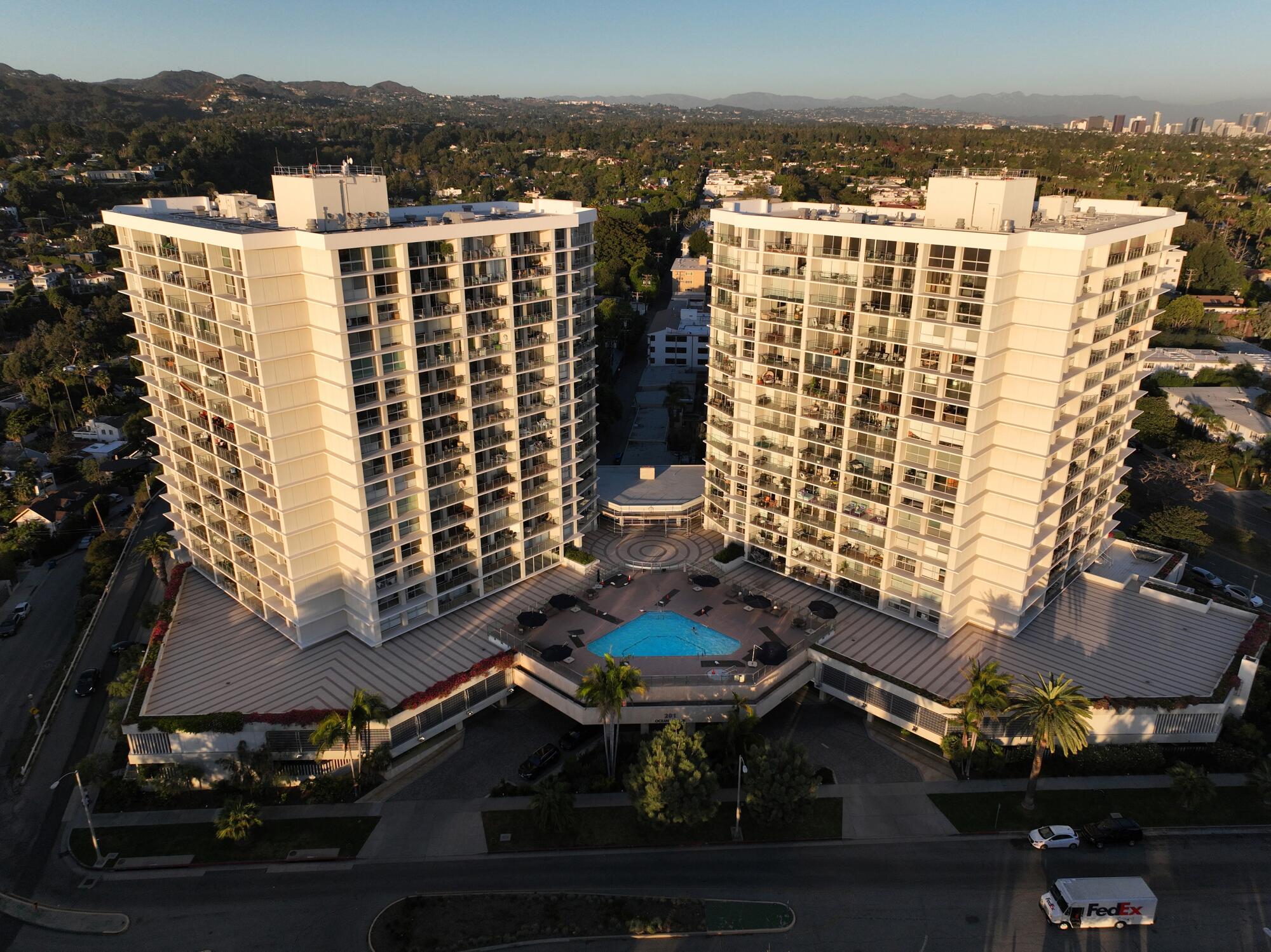
In a series of replies in the same email thread, Orlando acknowledged the HOA’s financial reserves were “a mess” and shared a list of legal bills that tallied up to $10 million. Brunsten said he had little recollection of his time as the attorney for Ocean Towers and declined to comment on the emails.
Spahi’s attorney did not respond to a question asking whether the HOA borrowed money to fight legal battles resulting from Spahi’s personal conduct.
As the lawsuits dragged on, some residents grew frustrated, but they felt as if they were hostages to the board. The HOA could jam up necessary repairs to a unit, limit a resident’s access to building amenities and decide when, or if, they could sell, according to interviews with residents and Wittenberg.
Lamm moved into Ocean Towers in the late 2000s. She said friends who worked in real estate had expressed concern about her buying a unit there, and once she moved in their advice became much more blunt.
“Don’t cross John,” Lamm said she was told.
In a declaration contained in court records, John Spahi said he bought his first unit in Ocean Towers in the 1980s and steadily built his empire.
In all, he and his family have owned at least partial interest in about 50 of the complex’s 317 units since 1984, according to a declaration in a lawsuit that John Spahi filed against Wittenberg. In the filing, he boasted about spending millions to renovate units that he and his partners would then rent out or sell.
The suit accused Wittenberg of making false and malicious comments when he called Spahi a criminal in a letter to shareholders.
“With the exception of a traffic infraction, I have a clean criminal record,” Spahi wrote in the declaration. “To the best of my knowledge, no court has determined that I stole money from any of Ocean Towers shareholders.”
Wittenberg’s claim of criminal conduct by John Spahi later would be echoed by the California attorney general’s office when it started looking into a company called Progressive.
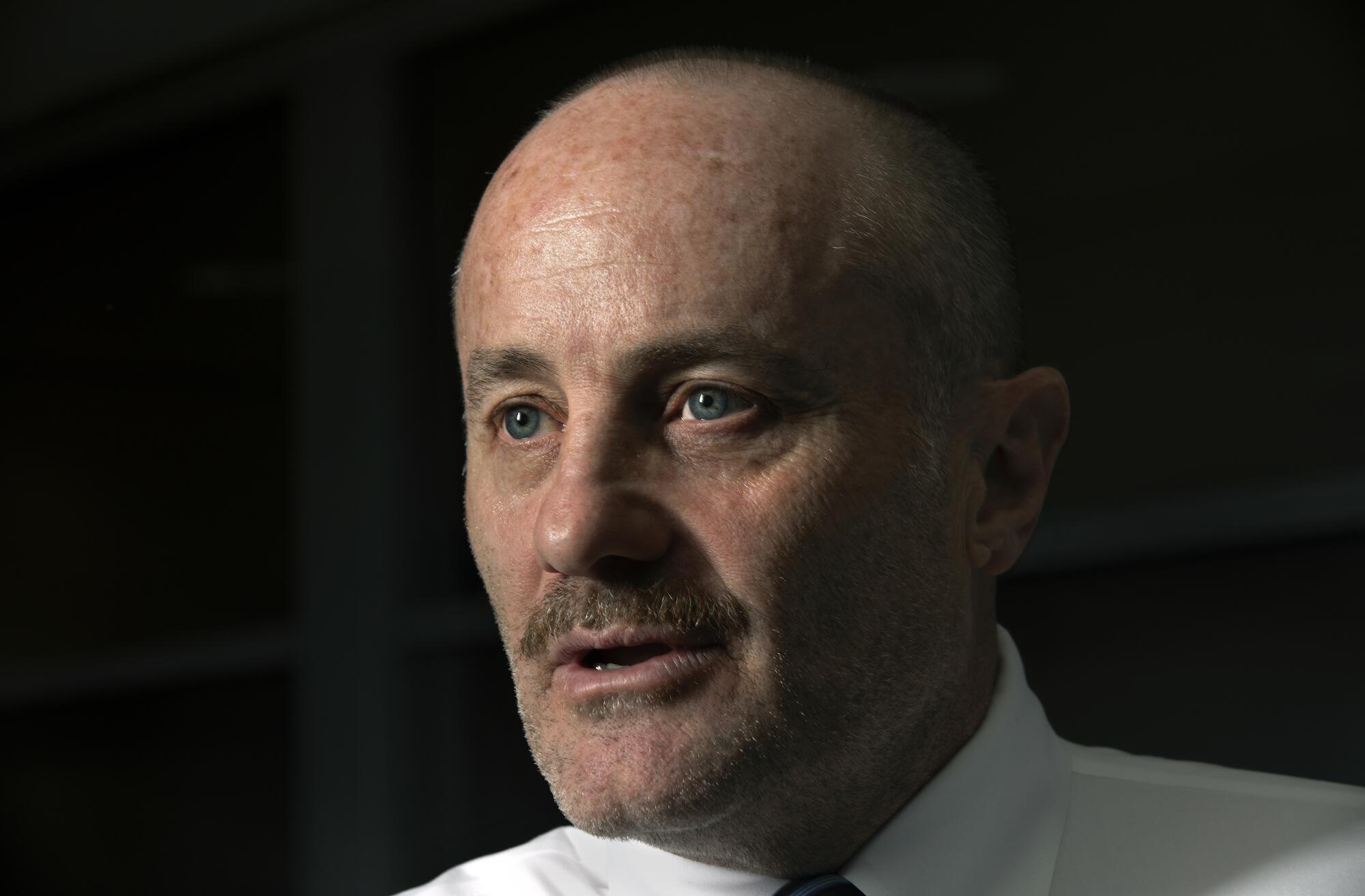
By 2010, the Spahis allegedly were formulating a new business venture. They just needed a little help from Omar’s then-best friend.
The man, who declined to be interviewed, provided The Times with a seven-page letter he sent to mutual acquaintances in 2021 laying out Omar’s alleged betrayal.
He requested anonymity for fear of retaliation from the Spahis. Court records identify the man only by his first name, where he is listed as an identity theft victim in the criminal case.
The idea for the construction company that would let the Spahis and Orlandos allegedly drain millions from Ocean Towers first surfaced on a drive home from the Coachella Valley Music and Arts Festival in Indio, according to the letter.
During a ride along Interstate 10, he and Omar decided to start a concert promotion company, with Omar acting as the financial backer and the friend “doing all the work,” the man wrote.
“Omar said he would setup the business and the bank accounts to make it a legit company and he did all the paperwork,” the letter said.
Weeks later, Omar picked the man up from UCLA and drove him to a bank on the Santa Monica Promenade. A bank employee was waiting with documents to incorporate the company, according to the letter.
“He pulls out the paperwork and I (very stupidly) sign it without reading it and Omar rushes me back to class,” the letter read. “I was in that bank for less than five minutes but I put down my social, my driver’s license.”
In the years that followed, Omar backed off from the idea, saying his family had lost a lot of money, according to the letter. The man didn’t think much of the company until 2020, when he received an ominous call from Omar.
“Omar goes on to tell me that him and his father used my name and information to start a company and that for the last 10 years they have been embezzling money from the Ocean Towers apartment building through this company in my name,” the letter read, echoing allegations in the criminal case.
“How did you even look me in the eye for, like, all these years and never tell me?” the man asked Omar on the 2020 call, according to the transcript from a civil suit obtained by The Times.
“I didn’t know the full extent of what was happening,” Omar said. “I was following instructions, until my dad told me ... you don’t understand how much I hate my family, but it’s because of s— like this.”
In charging documents against the Spahis, prosecutors with the attorney general’s office pointed to the phone call as an admission from Omar that the company, Progressive, was used to “embezzle money.” A spokesperson for the office declined to discuss the case.
The chain of events that spurred Omar’s phone call was put into motion years earlier, when a longtime Ocean Towers resident named Michael Reach finally decided he’d had enough of John Spahi.
The soft-spoken New York doctor had befriended John Spahi when he moved to California in 2001. The pair often smoked marijuana together on their beachfront balconies, where John Spahi would dispense unsolicited advice on life and women, Reach said.
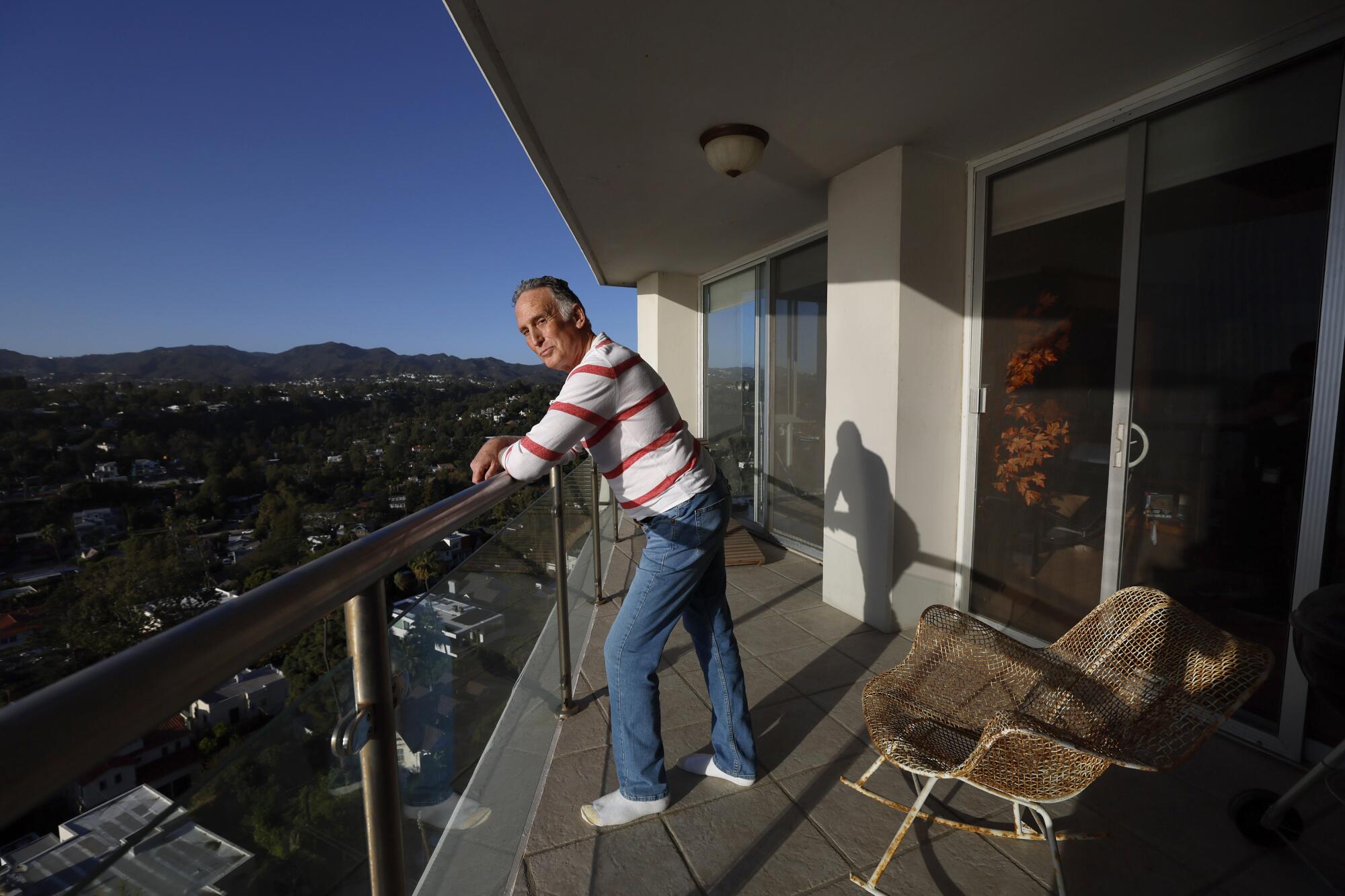
But Reach said he always suspected his friend was a “hustler.” Neighbors told Reach they had invested in the units John Spahi was renovating, hoping to profit off them as future rentals, but they rarely saw a dime.
The comments weighed on Reach.
One afternoon, while researching foreclosed properties in Southern California that he could buy as investments, Reach stumbled across two lawsuits involving Ocean Towers.
One was a U.S. Bank suit and the other involved National Cooperative Bank, which similarly accused the HOA under Orlando and John Spahi of trying to cancel the bank’s interest in individual units.
Reach said he contacted the lawyer representing NCB, who knew of Wittenberg and his legal wrangling with the complex. Not long after, Reach turned to Wittenberg for help.
With Wittenberg’s guidance, Reach filed a “derivative shareholder” suit against the HOA, accusing the Spahis and Orlando of misusing funds to fight personal legal battles and of violating “their duties to act in the best interest of the HOA and its shareholders.”
At first, few people in the buildings would support the suit, fearing retribution from John Spahi and Orlando. Those fears appeared validated when the board banned Reach from all common areas of the building and tried to have him evicted, according to the receivership motion and emails provided to him in discovery.
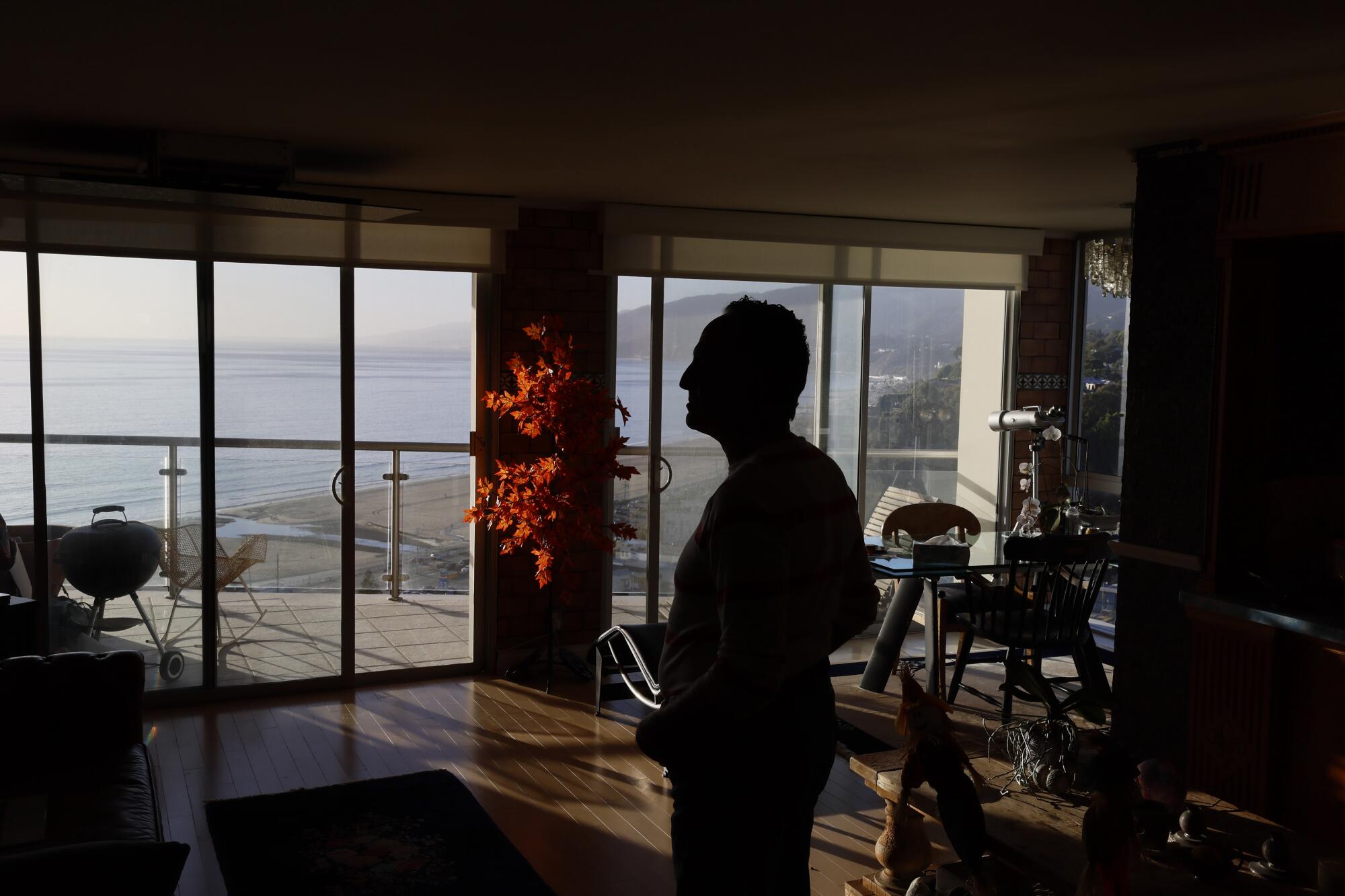
Orlando told John Spahi he wanted the police called if Reach so much as set foot in the Ocean Towers gym, according to those emails.
With Reach serving as the face of the lawsuit and the focus of much of John and Orlando’s outrage, Wittenberg and another resident, Ziba Soroudi, quietly gathered support within the building to file a motion seeking to place the HOA board in receivership. If a judge signed off on such a motion, it could force the Spahi-controlled board out of power and grant a new set of homeowners access to documents detailing the building’s finances, which they said were being improperly withheld.
At first, Soroudi said, she engaged in a covert campaign. Short phone calls led to secretive in-person meetings to discuss the lawsuit. Emails — easily shareable — were discouraged .
“We didn’t want spies in our midst,” Soroudi said.
Eventually about two dozen residents signed a declaration in support of Reach and Wittenberg’s allegations. As the lawsuit proceeded, e-mails were turned over that raised questions about the validity of HOA board elections.
In 2015, with criticism of the board mounting, Orlando canceled a board election, according to emails reviewed by The Times that were turned over as part of Reach’s lawsuit, alleging “questionable conduct within the election process.”
“Some shareholders complained that they were pressured by phone calls to vote for a particular person based on certain information,” Orlando wrote to board member Peter Alevizos.
Alevizos quickly shot down Orlando’s argument, noting he was describing routine campaigning.
In an interview, Reach said Dorothy Orlando would often go around politely asking homeowners to grant her husband their vote by proxy, and most would comply in order to stay in the Orlandos’ good graces. Reach called her “the face” of the operation.
In a declaration in a civil lawsuit, John Spahi’s former secretary, Judith Casey, said she was ordered to manipulate ballots to his benefit as far back as 2002. Casey, according to the declaration, sat in a unit with John and Dorothy and saw the two alter ballots cast for those “not on the HOA’s Management slate” and replace them with the names of “those of pro-management proxyholders.”
Casey said she ultimately refused to take part. Contacted by phone, Casey confirmed the details in the declaration were accurate but said she knew little else about John Spahi’s dealings in the building.
In a declaration opposing the appointment of the receiver, Spahi called Casey a “former disgruntled employee of mine” and denied rigging elections or tampering with proxies.
Soroudi said that, when election results were announced, non-Spahi affiliated candidates often had fewer votes than they should have, based on her vote and those of fellow supporters.
“It happened over and over and over — same pattern,” she said.
But potentially the most damning documents turned over during the lawsuit may have come from Omar Spahi. In a furious 2012 email exchange, Omar accused his father of things that would be echoed in allegations made by the California Department of Justice and numerous lawsuits against the board alleging malfeasance.
Mocking him as the “Great, Successful and Holy John Spahi,” Omar wrote that his father “embezzled money from a corporation so that he could buy some property. After he bought property he took out a ton of unfavorable loans.”
“He had to have his son go into bankruptcy because he couldn’t have the properties in his name due to all the judgments against him,” Omar wrote, also adding that, despite owning so many units in the building, John still “has to rig the election to win because everyone talks about him behind his back.”
In a later deposition, John said Omar’s allegations that he had embezzled money and rigged elections had no merit and that his son had “recanted those statements that were intended to anger and frustrate me.”
The emails between father and son did not elaborate on the reasons Omar went into bankruptcy, but the U.S. Bank lawsuits alleged the action was taken to delay foreclosure proceedings on properties in his name.
Depositions reviewed by The Times show that, in the late 2000s, the younger Spahi held a real estate portfolio valued in the millions at just 20 years old. At the time, Omar was an aspiring comic book writer who had only held jobs at a fast-food franchise and one summer stint as a bank teller, according to the depositions and emails sent by his father.
In 2016, John called the Santa Monica Police Department to accuse Omar of stealing a computer from him and told responding officers he was moving to have his son “evicted,” according to police reports. No one was arrested or charged with a crime in that incident.
In 2018, years after Reach’s initial lawsuit was filed, even the buildings’ lawyer seemed to agree with the growing chorus that questioned the board’s ability to represent its residents fairly.
“It looks to me that the Board is incapable of managing the [complex] for the benefit of shareholders because Spahi calls all the shots,” wrote attorney Steven Goldberg. “It seems that a receiver is in the best interest of the shareholders. Because of my duty ... I am inclined to say that at the next hearing if I’m still counsel of record.”
Attempts to contact Goldberg were unsuccessful.
In July 2018, a court order was issued appointing a receiver, which forced John Spahi and his allies off the board while terminating Orlando as the building’s president. Orlando had held the job for more than 30 years, raking in a six-figure salary that rose to $200,000 annually in 2016, according to a countersuit he filed against the HOA alleging he was “grossly undercompensated.”
Once in charge, the receiver, Stephen Donell, deemed the HOA “effectively insolvent” and imposed a special assessment on homeowners equal to 5% of the HOA’s expenses. He cited the need to pay for repairs, legal fees and the existing debt on the building — which wasn’t possible with the amount of money the old guard collected. Both Wittenberg and the current board declined to answer questions about the cost of the assessment.
In a progress report filed in court, Donell said he had been advised the assessment could create a financial burden for some homeowners on fixed incomes but that change was “essential and unavoidable” because of the “immediate cash flow crisis.”
Donell, who declined to comment, also hired a third party to oversee new board elections in 2019.
When the votes were counted, John Spahi and the Orlandos lost their influence — and their ability to hide the HOA’s detailed financial records.
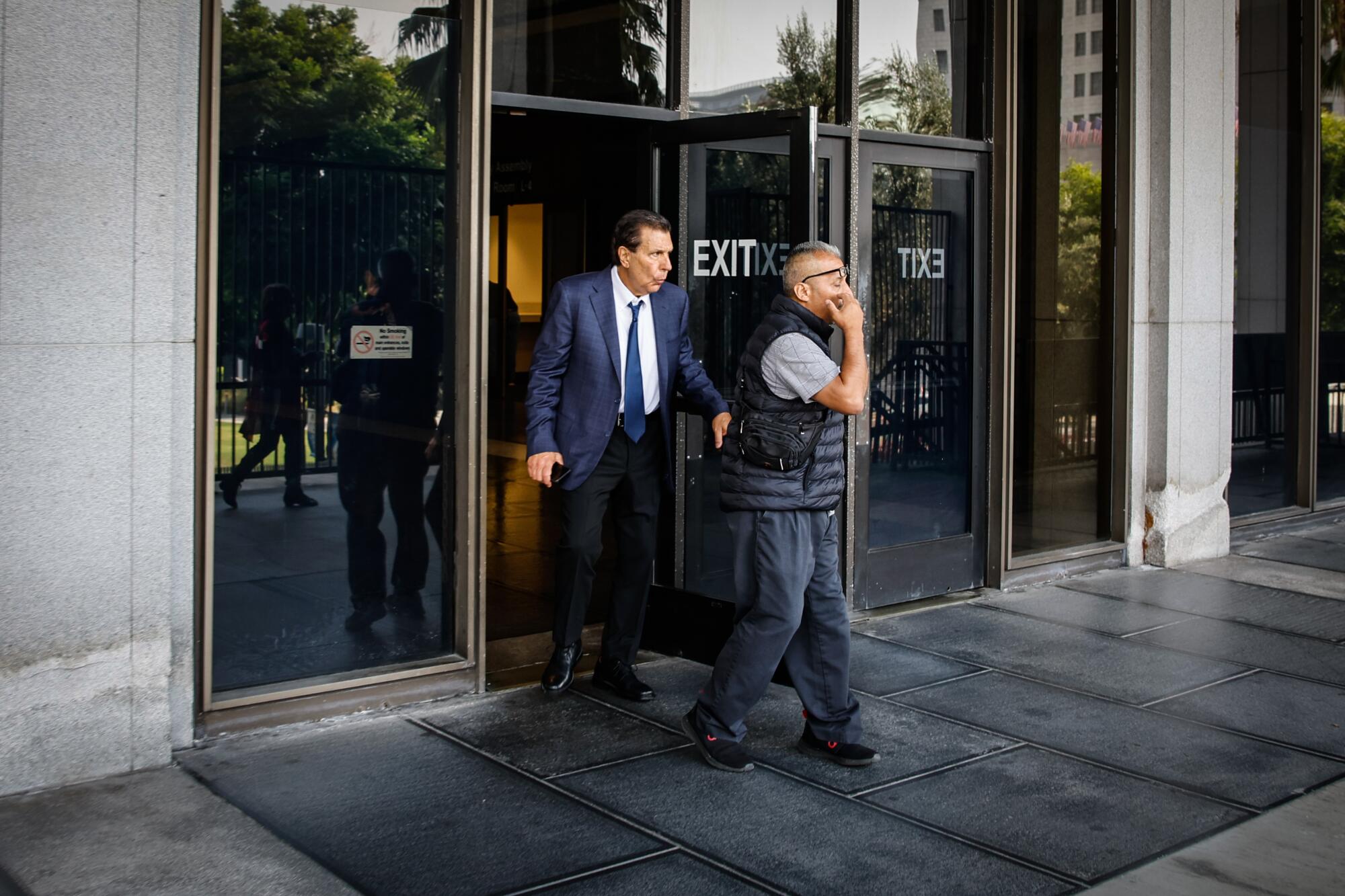
According to the indictment, a newly elected board member named Mitchell Levy realized the buildings had reported “approximately $40 million in negative cash flow” in recent years, nearly half of which was marked for “improvements.”
A review of the HOA’s check ledgers showed the complex had paid two main construction vendors in recent years: SPC Building Services and Progressive, according to the indictment. While Levy found records confirming SPC had worked on numerous projects, he was “unable to confirm whether Progressive Builders had ever completed any construction projects at Ocean Towers,” according to the indictment.
Levy went to the listed address for Progressive. Instead of a construction company, he found an apartment building, according to the criminal complaint. Progressive’s “headquarters” were just outside the UCLA campus where Omar had picked up his friend a decade earlier. Levy declined to be interviewed for this article.
Today, Wittenberg said, the HOA is financially sound and run by non-Spahi-affiliated members, including Soroudi.
“Homeowners at Ocean Towers came together as a community to successfully remove prior management, including former directors and officers who are now being prosecuted for embezzling HOA funds,” Wittenberg said. “The current management of Ocean Towers consists of caring homeowners and an independent, experienced management company. Since taking control over the property in 2019, new management has recovered millions of dollars and has a settlement agreement [entitling] it to recover up to $15 million.”
Under the terms of the settlement John Spahi entered into with the board in 2022, the HOA is entitled to $15 million — paid through the lease or eventual sale of his units. John Spahi has several years to dissolve any ownership stake at Ocean Towers and can never buy into the co-op again.
“I think the hard part — the bad nasty stuff is behind us,” Soroudi said.
Still, it may take time for the damage to the building and its residents to be fully undone.
According to documents filed in support of a receiver, the Spahi regime took out $20 million in debt on the buildings without shareholder approval, using loan proceeds to cover losses, including from legal fees.
A recent listing for a $1.75 million, two-bedroom unit at Ocean Towers showed the total HOA fee was $3,189 a month, with $1,774 for things like community upkeep and another $1,415 to pay the building’s loan.
In a 2017 letter that was an exhibit in a lawsuit, Wittenberg told shareholders if John Spahi wasn’t in charge “there would have been no reason to saddle you with $20 million in additional debt to cover up their illegal misappropriation scheme.”
In an email sent on behalf of the HOA, Wittenberg declined to say whether HOA fees are presently higher because of the alleged mismanagement, or when the building’s loan might be paid off.
John Spahi’s criminal trial has yet to be scheduled, but late last year, some of Ocean Towers’ older residents chartered a bus downtown to sit in on a hearing in the case.
Lamm said most residents ignore John Spahi when they see him in the building.
But not always.
Once, she recalled, a friend went up to him and asked a question that’s been on the minds of dozens of Ocean Towers residents for years:
“How is it that you’re not in jail?”
More to Read
Sign up for This Evening's Big Stories
Catch up on the day with the 7 biggest L.A. Times stories in your inbox every weekday evening.
You may occasionally receive promotional content from the Los Angeles Times.












